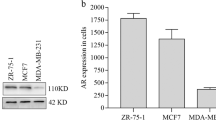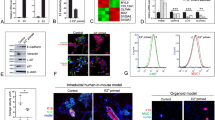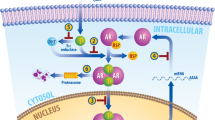Abstract
We have recently reported that about 30-40% of female breast tumours produce prostate-specific antigen (PSA) and that PSA production is associated with the presence of oestrogen (ER) and progesterone (PR) receptors. We have now developed a tissue culture system to study the regulation of the PSA gene in breast cancer. The breast carcinoma cell line T-47D produces PSA when stimulated by androgens, progestins and glucocorticoids/mineralocorticoids but not oestrogens. PSA mRNA appears approximately 2 h after stimulation; PSA protein appears after 4-8 h. Among 38 compounds tested, only androgens and progestins were able to stimulate PSA production at concentrations below 10(-9) M. Evidence that the progesterone and androgen receptors can regulate the PSA gene independently was provided as follows: (a) the progestin norgestimate, which does not bind to the androgen receptor, up-regulates the PSA gene at concentrations as low as 10(-10) M; (b) triamicinolone acetonide, which does not bind to the androgen receptor (AR) but binds to the PR, acts similarly to norgestimate; (c) the antiandrogen cyproterone acetate, which blocks the androgen receptor but has progestational activity, up-regulates the PSA gene at concentrations as low as 10(-10) M; (d) the antiprogestine mifepristone completely blocks the stimulation of the specific progestin norgestimate. Our tissue culture system identified androgen-progestin agonist activities of 17 alpha-ethinyloestradiol, the antioestrogen RU56, 187 and the antiprogestin mifepristone. Our data suggest that the expression of the PSA gene in the female breast is under the control of androgens and progestins. Our tissue culture system is a highly sensitive in vitro method for evaluating the biological activity of candidate compounds having agonist and antagonist steroid hormone activity.
This is a preview of subscription content, access via your institution
Access options
Subscribe to this journal
Receive 24 print issues and online access
$259.00 per year
only $10.79 per issue
Buy this article
- Purchase on Springer Link
- Instant access to full article PDF
Prices may be subject to local taxes which are calculated during checkout
Similar content being viewed by others
Author information
Authors and Affiliations
Rights and permissions
About this article
Cite this article
Zarghami, N., Grass, L. & Diamandis, E. Steroid hormone regulation of prostate-specific antigen gene expression in breast cancer. Br J Cancer 75, 579–588 (1997). https://doi.org/10.1038/bjc.1997.101
Issue Date:
DOI: https://doi.org/10.1038/bjc.1997.101
This article is cited by
-
Prostatic-specific antigen (PSA) levels in patients with polycystic ovary syndrome (PCOS): a meta-analysis
Journal of Ovarian Research (2019)
-
Free/Total Serum Prostate-Specific Antigen Ratio in Women with Colorectal Cancer Has Prognostic Significance
Journal of Gastrointestinal Cancer (2017)
-
Putative functions of tissue kallikrein-related peptidases in vaginal fluid
Nature Reviews Urology (2016)
-
Reconnoitring the Status of Prostate Specific Antigen and its Role in Women
Indian Journal of Clinical Biochemistry (2015)
-
A case of metastatic cancer with markedly elevated PSA level that was not detected by repeat prostate biopsy
BMC Research Notes (2014)



